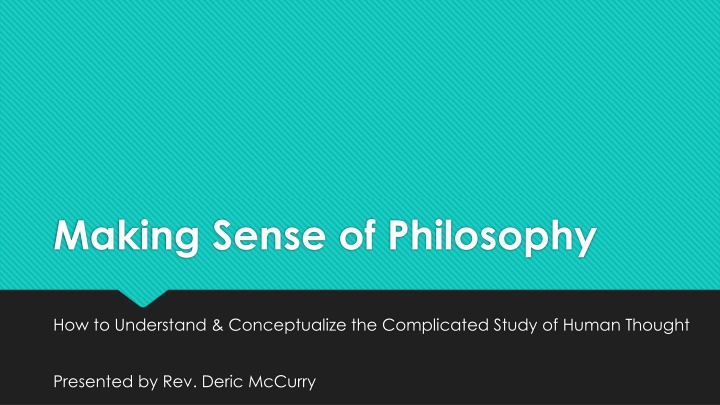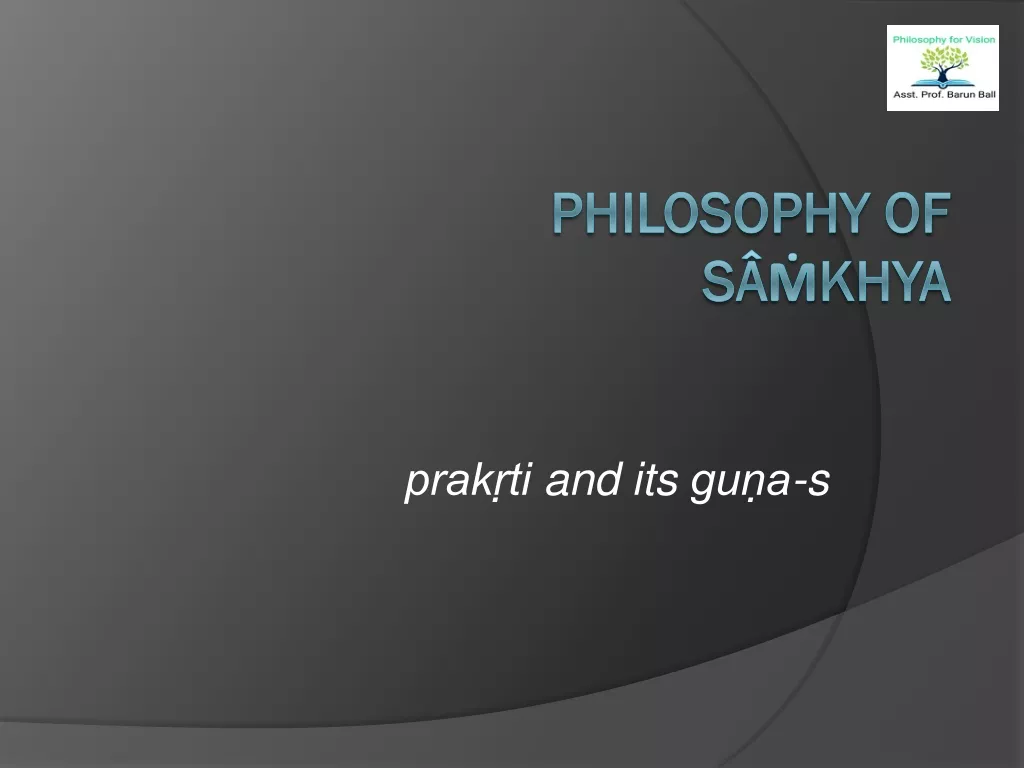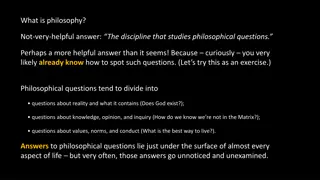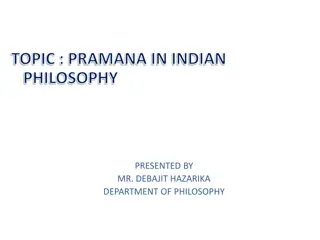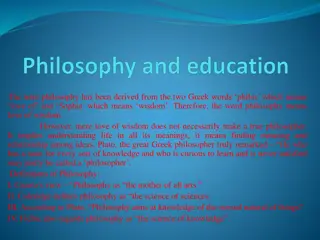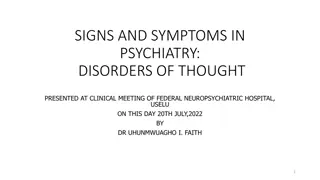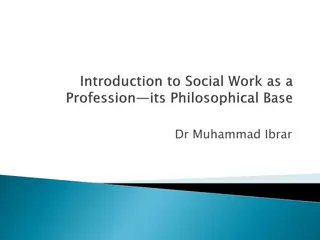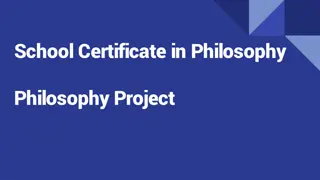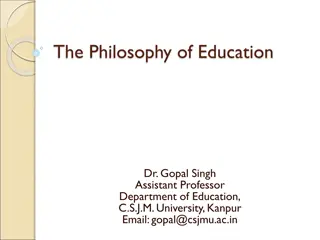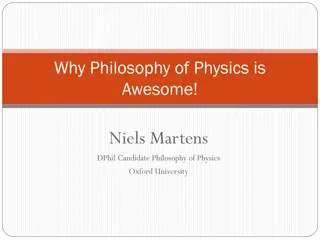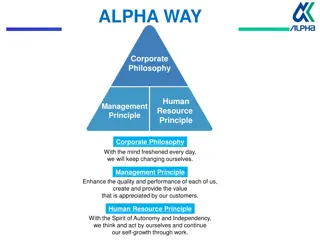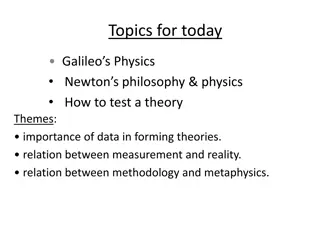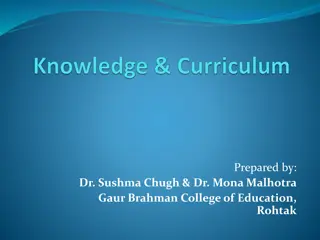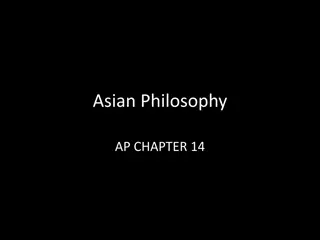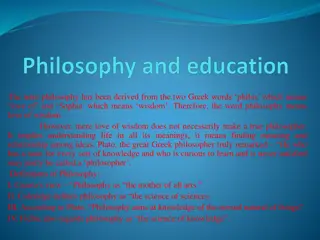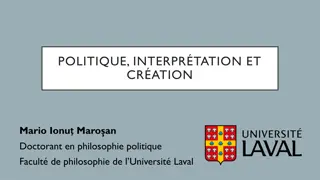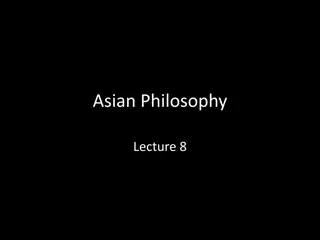Philosophy: A Guide to Understanding Human Thought
Dive into the intricate world of philosophy with a comprehensive guide presented by Rev. Deric McCurry. Gain insights into logic, epistemology, metaphysics, and aesthetics, and explore prominent philosophies through debates on existence, truth-seeking, and persuasive reasoning methods.
Download Presentation

Please find below an Image/Link to download the presentation.
The content on the website is provided AS IS for your information and personal use only. It may not be sold, licensed, or shared on other websites without obtaining consent from the author.If you encounter any issues during the download, it is possible that the publisher has removed the file from their server.
You are allowed to download the files provided on this website for personal or commercial use, subject to the condition that they are used lawfully. All files are the property of their respective owners.
The content on the website is provided AS IS for your information and personal use only. It may not be sold, licensed, or shared on other websites without obtaining consent from the author.
E N D
Presentation Transcript
Making Sense of Philosophy How to Understand & Conceptualize the Complicated Study of Human Thought Presented by Rev. Deric McCurry
Whatchu Know?! Philosophy is complicated and confusing Framework for better foundational understanding of philosophy Philosophy 101 in an hour Focus Points Overview of Philosophy Philosophy in Debate Logic Epistemology
Overview of Philosophy Logic Reasoning based on a strict set of validity principles Epistemology Theories of knowledge that seek truth & understanding Teleology Deontology Metaphysics Theories that deal with existence & principles of existence Axiology/Aesthetics Discussion of beauty
Overview of Philosophy Logic Reasoning based on a strict set of validity principles Epistemology Logic Reasoning based on a strict set of validity principles Epistemology Theories of knowledge that seek truth & understanding Theories of knowledge that seek truth & understanding Teleology Teleology Deontology Deontology Metaphysics Theories that deal with existence & principles of existence Axiology/Aesthetics Metaphysics Theories that deal with existence & principles of existence Axiology/Aesthetics Discussion of beauty Discussion of beauty
Metaphysics & Aesthetics in Debate Prominent Metaphysical Philosophies Baudrillard Symbolic exchange Heidegger If today was your last day Nietzsche Is existence better than nothing at all Use of Aesthetics in Debate Environmentalism Extinctionalism
Logic in Debate Inductive Reasoning Conclusion follows with highest probability Deductive Reasoning Conclusion is necessitated Socratic Method Truth seeking through persistent questioning
Logic in Debate Rationally Persuasive Argumentation Debate Claim Warrant Impact Real World Warranted Inference All true premises No independent line of argument against the conclusion Argument does not beg the question Burden of proof
Logical Fallacies Red Herring Changing subject Slippery Slope Domino-effect Straw man Mispresenting your opponent s argument and refuting it Two wrongs make a right Justifying wrong actions based on precedent Is-Ought Just because something is some way does not mean it should be False Dichotomy Argument says there are only two options: A or B, when there are C, D, E Ad Hominem Attacking the debater not the argument Argument from omniscience/authority You/one person doesn t know everything about anything Appeal to ignorance/force/pity Appealing to lack of evidence/knowledge or to power/feeling sorry for something as proof Argumentum ad populum/Bandwagon/tradition Just because something is popular/has always been done doesn t make it right Post hoc, ergo propter hoc Correlation = causation
Epistemology Teleology Teleology Looking at the end result of an action to see if the results are good Aristotle Virtue Ethics Being virtuous Innately doing right Crossroads of bravery & wisdom Is this something everyone possesses? Utilitarian Theories Calculus of utility Many people equate greatest good for greatest number (WRONG!) Maximizing utility The metric (well-being/prevention of harm) determines the utility
Epistemology Teleology Social Contract Theories Infinite number of them US Constitution Locke State of nature is good but is made better through order Hobbes State of nature is evil and requires order Rousseau Man is free but everywhere is in chains How to structure society in the world we live in Pragmatism Most practical solution to situation, doesn t intend to make everything better/happy just closure
Epistemology Teleology Marxism Material conflict Proletariat and Bourgeoise Conflict between the forces of production and means of production Solution Common ownership of production/consumerism Creation of classless society From each according to his ability, to each according to his needs Libertarianism Laissez-faire Cosmopolitanism Globalization
Epistemology Teleology Egalitarianism Equality/Equity Relativism Knowledge is situational (culture) Intercultural communication Some would argue this is wisdom
Epistemology Deontology Deontology Doing the right thing in every situation regardless of the outcome Altruism Doing the right thing because you have a second order desire to do so Conception of morality Desire Harry Frankfurt Benevolence/Beneficence Doing the right action because you have a first order desire to do so
Epistemology Deontology Immanuel Kant & Kantian Ethics Categorical Imperative First Formulation Act only according to that maxim whereby you can at the same time will that it should become a universal law without contradiction. You believe in and uphold your morals with consistent action Golden rule Maxim absolute truth Second Formulation Act in such a way that you treat humanity, whether in your own person or in the person of any other, never merely as a means to an end, but always at the same time as an end. Treating people humanely as you strive for an end is an end in itself Third Formulation Therefore, every rational being must so act as if he were through his maxim always a legislating member in the universal kingdom of ends. Never forget that you have a continuing responsibility based on your morals Treat everyone as you would treat yourself based on the Categorical Imperative
Epistemology - Politics Liberalism (not Democratic Liberal) Rejection of power politics/Emphasis on diplomacy Quid pro quo International/interorganizational cooperation and governing bodies I.e. favors the UN Realism States/government entities rational but self-interested actors International politics is anarchic International/interorganizational cooperation occurs to assure mutual self-interest Ensure self-preservation Machiavellianism
Rawls & Nozick Socioeconomic Justice John Rawls Robert Nozick Justice as fairness Minimal State State exists merely for safety Veil of Ignorance Anarcho-capitalism Maximize position Entitlement Theory Liberty Principle Principle of justice in acquisition Everyone Guaranteed Same Liberties Historical approach Difference Principle Principle of justice in transfer Differences benefit least advantaged Principle of rectification of injustice Redistribution of wealth Fair equality of opportunity
Conclusion Four Branches of Philosophy Four Branches of Philosophy Logic Epistemology Metaphysics Aesthetics Logic & Epistemology in Debate Discussion/Questions
